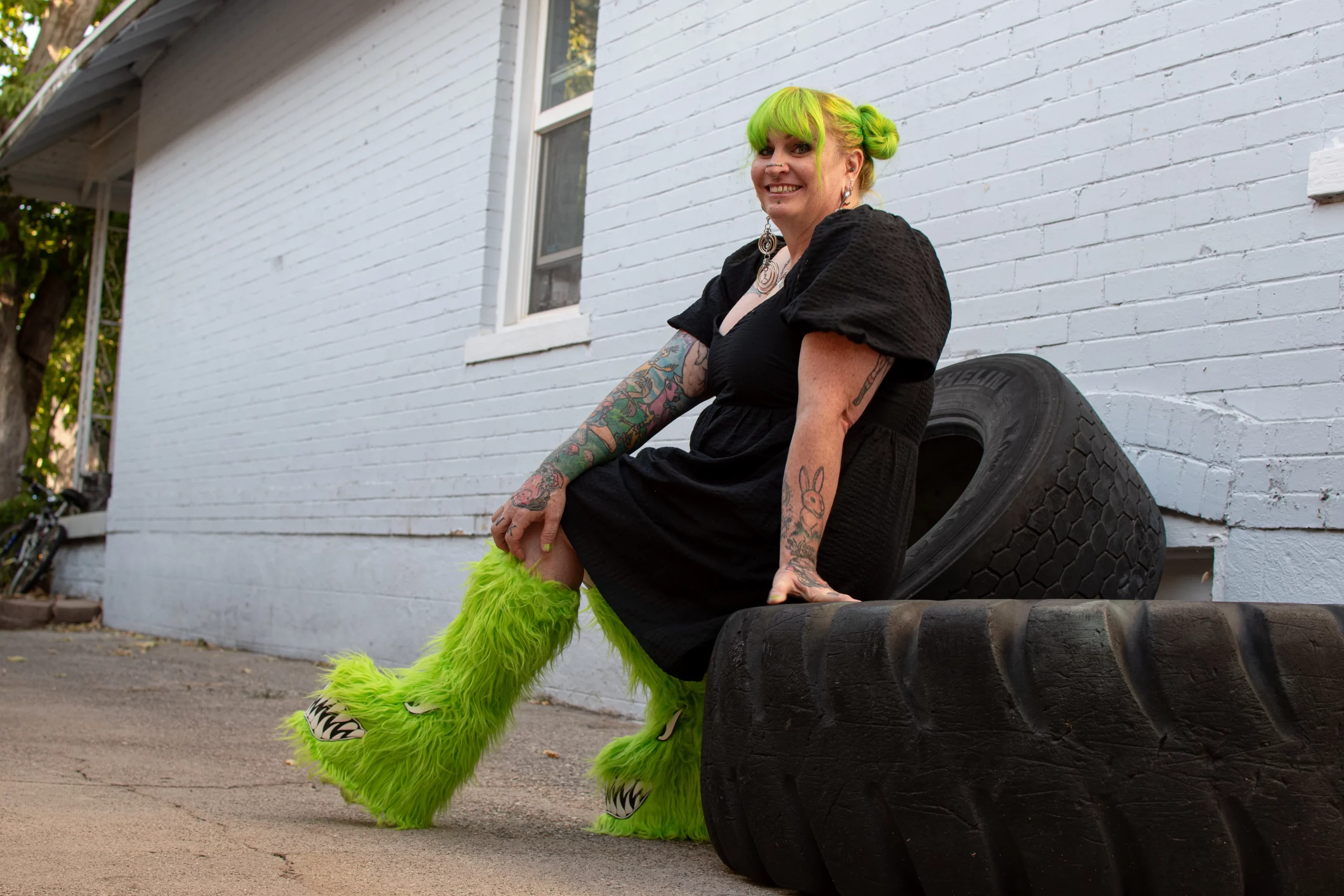
SLUG Style: Kelly Green
Slug Style
Kelly Green is Salt Lake City’s own comic book action hero, who laid claim to that shade of neon green long before “brat” was anything other than an insult. As a prolific punk rock performer (currently fronting Fight the Future), jewelry maker, trauma-informed certified personal trainer and superpower athlete—in hiking, rock climbing, strongman, powerlifting, football and more—Green’s passion for fighting back against systems of oppression shines a light of politically-charged badassery on how their many hobbies inspire others in the community. Keep up with their many hobbies and killer style on Instagram at @kgxvx and check out their jewelry at @discordia.regalia.
Every month, SLUG Style features a distinct member of the community and asks them why they do what they do. Exploring more than just clothing, SLUG Style is an attempt to feature the people who give Salt Lake City flavor through personality and panache.
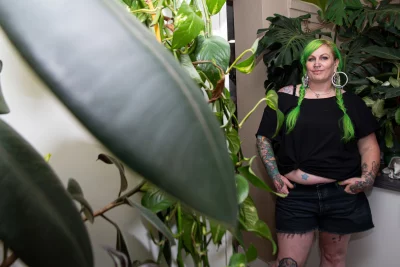
What are your stylistic influences? This could be a band, decade, fictional character—anything.
Somewhere between an ‘80s cartoon villain and a comic book heroine.
What are your interests or hobbies? What is the hobby or interest that you have that no one would realize to ask you about?
Playing music, hiking, jewelry making, rock climbing and weightlifting. I don’t think people would be surprised by much about me except that I have an affinity for formulaic romantic comedies; I find them oddly comforting.
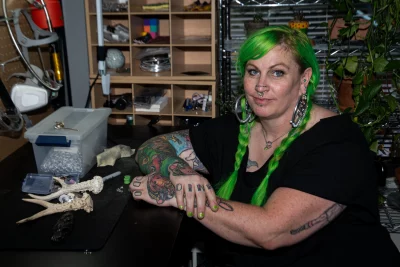
What have been your most rewarding experiences as a musician/performer?
Connecting with other folks of marginalized genders after playing a show, when people have felt seen through my words or are excited to be represented on stage. I’ve loved to see how many more femme and trans musicians there are playing music currently than there were when I started playing in bands.
What are your biggest musical inspirations that also inform your style?
When I was eight I wrote in my journal that I wanted to be a “singer like Cyndi Lauper.” I’m pretty sure that’s shaped the path of my entire life.
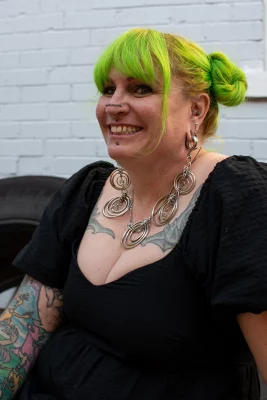 Are you always “on” or would someone see you at the grocery store, for example, with less elements of your style?
Are you always “on” or would someone see you at the grocery store, for example, with less elements of your style?
If someone sees me at the grocery store … I’ll likely be wearing flip-flops and pajamas with my hair tied up on the top of my head, or gym clothes. Putting “on” an outfit is definitely more of a self-care treat for me—a way to get hyped up for a day of work, or feel extra confident for a show.
As someone who’s been involved in the worlds of fitness and music, why is spreading the message of body positivity important to you? How does that intersect with your personal style and perceptions of fashion, if at all?
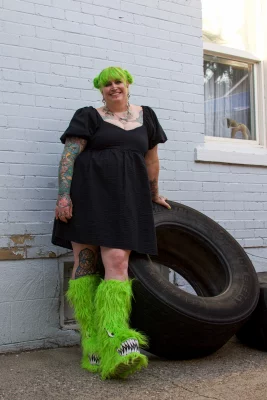
As someone with a history of disordered eating, I think it’s important to remind folks that the “ideal body type” is rooted in racism and upheld in capitalism. The whole beauty industry is designed to make us hate ourselves and fuel our insecurities so companies can profit off of that. Folks living in larger bodies are shamed [in]to think[ing] we should hide our bodies and I refuse to do that. I honestly don’t even like the saying “body positivity” because it’s often used by “fitness influencers” that are still often fatphobic. People should wear whatever the fuck they want.
Could you speak to your journey as a specifically trauma-informed personal trainer? How does that change things for you and for your clients?
Fitness can be very healing and empowering when it’s being done for reasons someone has chosen for themself vs. being shamed into the obligation of it. When we were kids we used movement for play, and that’s how we should continue to see it. Movement should bring us happiness and challenge us. A lot of people see exercise as a punishment for something they decided to eat and that’s not productive for our mental health. I try to help folks find types of movement they enjoy, so they can work on feeling control over their space and their bodies.
How has your involvement in such a wide variety of sports and strength training changed your sense of style and self?
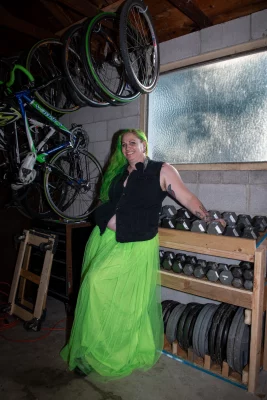
When I started focusing on strength sports, I began to embrace muscles and size rather than striving to shrink my body. I was proud of what my body was accomplishing with weights (or on the field when I played football). Off-the-rack clothing doesn’t always fit my broad shoulders and large thighs so I tend to customize many things (which is why you’ll rarely see me in T-shirts with sleeves).
Can you tell me a little bit about your jewelry business? How did you get started there, and how does your style shine through with that?
I wanted to make jewelry because there were things that I wanted to wear that I could not find. That’s kind of how I start all my hobbies … I just want something so I learn it, and then I want to share it with other people. I think the designs are all pretty reflective of my chaotic brain.
If you had to describe yourself in three words, what would those be?
Compassionate, intolerant, vulnerable.
How has your personal style evolved over time?
It honestly hasn’t [changed] that much. I started dying my hair and finding remnants of ‘80s new wave fashion to mix with my “goth” (not called that at the time) aesthetic in junior high … I’ve always been undecided on what kind of style I wanted so I just mixed them all up. We get this life; [we] might as well live it with no regrets and wear a good costume for the show.
If you could give a piece of advice to your younger self, what would it be?
Don’t ever feel guilty for speaking your mind—it matters to someone.
Read more SLUG Style features:
SLUG Style: Lou Sant
SLUG Style: Kat Aleman
